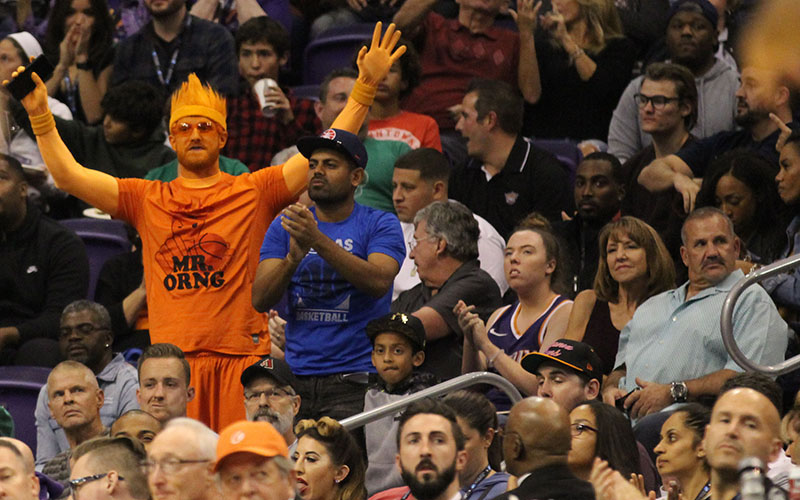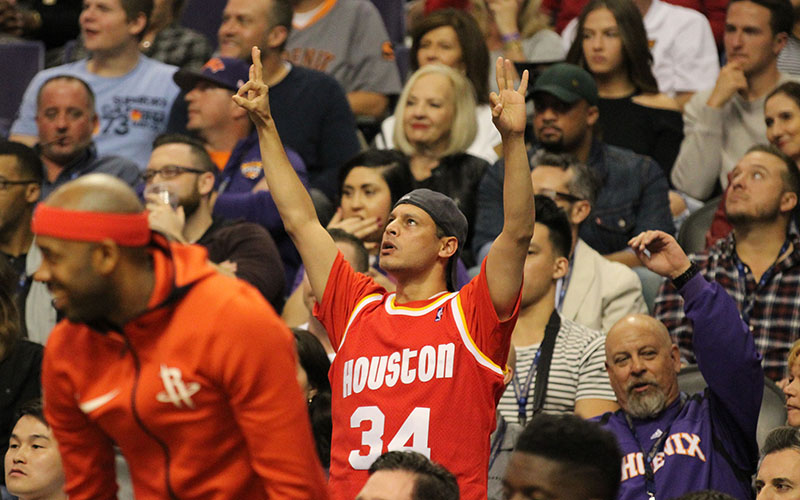
Fans will go all out to support their favorite team. Psychologists believe much of it has to do with the connection it allows them to make others. (Photo by Jamie Nish/ Cronkite News)
TEMPE — Scott Johnson, an avid Minnesota Vikings fan, has not missed watching a game in nearly 20 years, he said.
He also admits to once skipping a good friend’s wedding to attend a Vikings game against the Lions and remembers watching another on his phone during a family member’s funeral.
Sports fandom comes in a variety of forms — from low-key game attendee to face-painting screamer — but it is almost always rooted in a desire to connect.
“You’re walking down the street and you see someone wearing a shirt for your team, and you feel this instant connection,” said Dr. Bettina Lehnert, a licensed psychologist in Scottsdale. “People will talk to you or connect because you’re wearing this shirt, whatever sport it is.”
Humans have an innate desire to feel connected with others, Lehnert said, and that sports fandom, much like affiliation with a religious group or political party, is another way for people to feel part of a shared ideal or goal.
For Johnson, sitting at Four Peaks Brewing Co. in Tempe — one of many businesses in the Phoenix area catering to Minnesota football fans on game day — and wearing a Vikings jersey and hat, the establishment is one of the few he can go to and at least attempt to emulate the feeling of being back home near Minneapolis. Johnson moved to Arizona due to a new job in 2012.
“It’s no Dinkytown, or U.S Bank, but it’ll do,” he said, referring to a row of streets filled with bars and restaurants on the University of Minnesota campus, and the new U.S. Bank Stadium, where the Vikings play their home games.
A self-proclaimed “fanatic,” Johnson said it was his love of Vikings football that actually helped him fight some of the instant loneliness he felt moving to a new location from a state and team he had lived in and supported his whole life.
Knowing any of the bars catering to Minnesota fans could be a place to go on football Sundays, he could feel comfortable and know that, at least for a few hours once a week, he could feel part of a group that transcended geography.
Shawn Klein, a Doctor of Philosophy at Arizona State University who specializes in ethics, popular culture and the philosophy of sport, said that an affiliation to the home team, even if somebody’s home is thousands of miles away, is still a way of continuing a rapport with family and friends still in the area.
“The fandom for that team can become a way of maintaining, or even intensifying, that relationship,” he said.
Being a sports fanatic not only has an effect on the people themselves, but also the players they are watching.

A Houston Rockets fan celebrates during the team’s win over the Suns at Talking Stick Resort Arena, Thursday, November 16, 2017, Phoenix. (Photo by Jamie Nish/ Cronkite News)
That access means business for the teams, even from those fans not in the area, and that constitutes higher incomes for players. Though tickets, merchandise, concessions and other sales from avid fans makes up a lot of the money that eventually goes to player salaries, and the popularity of the athletes can gain them endorsement deals or other business opportunities, professional athletes may often take issue with “crazy” fans.
Phoenix Suns rookie Josh Jackson was fined for making a gesture simulating gunfire at a fan in his first NBA regular season road game against the Los Angeles Clippers in October, after a fan spent most of the game allegedly shouting profanities at him.
“I learned that we can get fans kicked out of the game. I didn’t know that but that’s a good thing to know now. Because it’s kind of ridiculous fans can come and say whatever they want to us, and we can’t do too much about it,” Jackson said.
On the opposite end of the spectrum, former Suns guard Eric Bledsoe, who had been with the team since 2013 before being traded to the Milwaukee Bucks in November, said he has almost experienced too much love and appreciation at points in his basketball career.
He said that, for the most part, fans are usually pleasant, but that one particular individual asked for a favor that made him uneasy.
“One guy wanted to buy my ice pack once, so that was kind of weird,” he said.
Besides the relationship with athletes and coaches on the playing field, fandom can also manifest itself in how those cheering for opposing teams treat one another.
Beyond a couple verbal jabs thrown around about one team being better than another, fan arguments at their worst can lead to physical altercations, like a man wearing a Los Angeles Dodgers jersey being stabbed to death near AT&T stadium after the team’s road game against the San Francisco Giants in 2013.
For many, however, fandom is a far more innocent endeavor.
Asked what got him into sports fandom in the first place, Johnson said football became a major part of his life in 1998 when the Vikings drafted receiver Randy Moss. An instant star and an extremely entertaining player to watch, he said it was hard to take his eyes off the TV.
Games became a part of the Johnson household from that point, both at the stadium or at home, and have not stopped since, even when Scott moved away years later.
“My dad and I just started watching them together, went to a ton of games at the Metrodome, and if I don’t go back home for games, which I do sometimes, we call each other on days after games and stuff because we don’t live in the same state,” he said. “It’s a tradition and I think it keeps us closer.”
Lehnert speculated that many of those who are “really into being a fan” might have similar stories growing up.
She said the games can serve, for some, as a way to relive childhood or past memories, or even as a method of feeling proud of one’s roots.
“It’s like a connection to a community for emotional and nostalgic reasons. Just for a sense of belonging and a sense of camaraderie that goes along with that,” she said.
At this point in his life, Johnson said his fandom has “gone down.” His love for sports has, admittedly, caused him to miss events and important moments for family and friends.
Now, with technology such as NFL Sunday Ticket, or NBA League Pass, allowing a subscriber to record and watch any game at any time conveniently, Johnson said the issues of missing a game that were prevalent years ago no longer exist.
“I can re-watch or look at it later, which makes me miss less stuff, but still, it probably adds to my craziness about sports because now it’s so easy,” he said.
Lehnert holds a similar view.
“If you’re sort of fanatic about something, then the accessibility to it increasing is only going to worsen the problem,” she said.
Klein said that fans, to a certain extent, may see the teams they cheer for as another facet of their being, or part of their personalities, certainly with more contention than that between supporters of other pockets of entertainment or pop culture.
When a fan’s identity is attacked, Klein suggested, he or she may subconsciously experience a hazard to a part of what they believe in, which can lead to misbehavior, and even aggression.
“I think there’s something to the connection to the team. It becomes part of our identity, becomes who we are. It becomes an extension of ourselves. And if we feel threatened, our identity gets threatened,” he said.
However, he said the majority of fans, even the ‘die-hards,’ can find satisfaction, and even self-esteem, in creating a relationship, though admittedly one that is not reciprocated with a team for years.
Fandom, if practiced correctly, and not to an extreme, can actually be a healthy habit, and can be something for people to take pride in.
“I think if you’ve grown up with a team, connected with a team over a long period of time, there’s a value to the fact that the relationship exists. Because of that value, there’s still a kind of logic in maintaining that,” Klein said.